Building Sacred Community: Erev Rosh Hashanah 5778
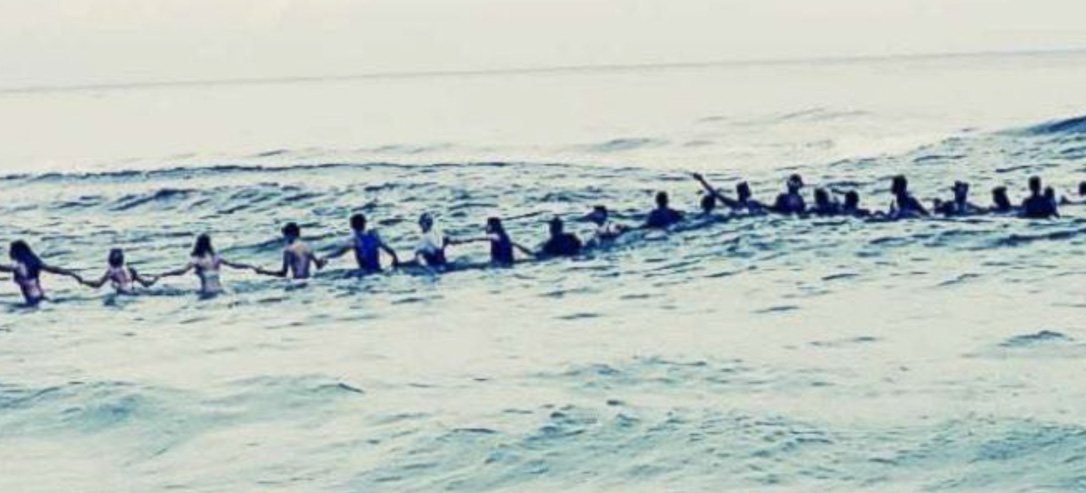
By Rabbi Heather Miller
A Story: Rabbi Kushner was once asked to give a tour of his congregation’s buildings to some elementary school children in his day school. He decided that the finale of the tour would include ending in front of the ark, opening the doors and showing its contents.
So, he took the children around all of the other parts of the congregation, introducing them to everyone he saw along the way. By the time he finally got them all in front of the ark, the school bell rang. Class was over, so he decided to save that sharing for another time.
That night, Rabbi Kushner received countless emails from the parents of those children who told him that their kids were so genuinely curious about what was in the sacred ark that they insisted their parents write to him to ask him to complete the tour first thing in the morning.
The next day, to assuage their curiosity, he resumed the tour, but when he did so, he began first by asking them, “well what do you think is behind the doors of the ark?”
The first child replied with a simple answer: “It is empty.” That was a very existential type of answer.
The second child replied “It is a brand new car!” Rabbi Kushner laughed.
The third child smugly stated, “It is the scrolls of the Torah.” But just as Rabbi Kushner was going to affirm this child’s correct answer, a fourth child said, “I know what is behind the doors of the ark! A mirror!”1
And, isn’t that what this High Holy Day season is about— this is a holy day season to open the doors and look into the sacred reflection of ourselves, to hold the mirror to ourselves as individuals, as a community. Tonight begins the sacred 10 days of repentance, the 10 days of reflection, pregnant with the possibilities of introspection-inspired transformation.
We take an accounting of our souls to consider where we have been so that we can realign with where we want to go.
Reflecting upon the events of 5777, many of you have expressed to me that this year has felt a lot like we were turned around and are now facing backwards. You expressed concerns over the headlines in the news. Most of all: escalating threats of nuclear warfare, the proliferation of swastikas and racial slurs, inequities in our justice system, murder in Charlottesville. You have expressed grave concern over the hangings of gay men in Chechnya, and over terror attacks where people weaponize everyday automobiles. You have wondered what this world has come to since it seems that we, as a society, can’t even recognize the humanity in the other.
I recognize that our tradition, in its asking you to revisit your feelings from this past year, might lead to a hollow sadness. A dis-ease in your soul. I feel it, too.
When I think about this year, I keep coming back to that terrible and terrifying story about the five teens who videotaped the drowning of their neighbor in a Florida pond. Did you hear about this? They were standing less than 20 feet away, and they videotaped his death with their cell phones.
Instead of lifting a finger to help him, they could be heard laughing at him and taunting him. Police say that “even after the teens recorded the video and witnessed the man drown, they did nothing to alert authorities.”2
That feels like the theme this year— an overwhelming lack of empathy, a lack of sensitivity, a lack of care. An absence of values— but many would tell you that it isn’t an absence of values as much as it is a failure on our collective part to teach and adjudicate decency.
For instance, the five teens who watched their neighbor drown violated no law. There is no law in the state of Florida where a citizen is obligated to render aid or call for help for anyone in distress.3
The Cocoa Police Department spokeswoman, Yvonne Martinez, told CNN that, “If there was (a law like that) we would charge them. No one deserves to go like that…We don’t have anything criminal resulting from that incident.”4
But there is a Jewish principle in the Babylonian Talmud, found in the Bava Kamma, the tractate on tort law. On folio 56a, we learn, “פתור בדיני אדם וחייב בדיני שמים/ [it is possible for a person to] be exempt in a human court, but liable in a heavenly court.”5 That is to say, that even back then, in the 5th century, Jewish Sages felt this disjunct between secular law and moral code.
They give cases of someone whose pitcher broke and the person didn’t pick up the shards— not liable in human court but responsible in the heavenly court. Or the case of entrusting a minor with fire—not liable in human court but responsible in the heavenly court. Or the case of someone who could have prevented another’s camel from falling but didn’t—not liable in human court but responsible in the heavenly court. Through all of these cases, the Sages drive home the point that just because something is technically legal, doesn’t mean it is moral.
Jewish law attempts to articulate a high standard of morality. The Torah articulates clearly that we are not to stand idly by when a fellow is in trouble, and insists that we ARE our brother’s keeper. It is incumbent upon us to act. Our Jewish DNA is engrained with the principle that saving a single life is like saving an entire world.
We know that kol Yisrael aravim zeh b’zeh— all of Israel is responsible for one another. We must empathize with, and help those around us. The implication is that we are linked and that humanity and dignity is to be preserved. The great thing is that this standard can be enacted in real life. And some people do “get it.”
I have personally experienced the grace and care of total strangers at an incredibly vulnerable moment. The night of our b’nai mitzvah, my brother and I flew to Israel with our grandmother for an unforgettable trip. There, we met our congregational community and toured as many places of significance as possible over the course of 10 days.
We started each morning with a grand buffet of regular Israeli breakfast— don’t get too excited— it consisted of cold fish and raw vegetables. As an American accustomed to hot cakes and scrambled eggs, I balked at the spread and opted to save my appetite for copious amounts of lunchtime falafel and shawarma.
One morning, after not eating breakfast and before lunch, our tour guide took us to Hadassah Hospital to see those famous Chagall windows. Our rabbi ran into an old friend who was an administrator there, and before we knew it, we were invited into the NICU— that is the neonatal intensive care unit.
Our large group entered the small confines of the ward. As we shuffled into the stuffy space, I looked up and saw a tiny human hooked up to tubes. Immediately, I blacked out. I fainted.
Fortunately, someone behind me caught my head before it hit the ground and when I came to, several nurses were fanning me and checking my pulse. I was escorted by wheelchair to a gurney, pillow placed under my head; I was given orange juice and monitored for about an hour until I completely recovered. I learned about the sacred obligation of individuals one to the other, and the power of human bonds and community that day— by the example of total strangers in a land far from home, as a minor, without my parents.
As I reflect back on that trip, I realize that it was the perfect introduction to Jewish adulthood— a real world example of what kind of responsibility one should take for another. On that trip, I also learned to stomach cold, fishy Israeli breakfast lest I faint. It is actually quite good once you get used to it! I look at that experience as an ideal— and a kind of glimpse into the world that I hope to create, where people truly care about each other.
But the headlines of this year, littered with story after story of negativity, neglect, attack, and anger. We were brought to a place of wondering if anyone operates with this sense of responsibility for the well being of others anymore?
And so, there is a feeling of disjunct between what we know to be derech eretz/common decency, and what the law requires, between the ideal, and reality. And that is scary.
Because we begin to wonder— am I all alone in this world? Would someone just sit there if I had fainted? Or if I was drowning? Or if I was beaten up? Or if policies outlawed the formation of my family? Where is the sense of mutual responsibility?
In the Unetaneh Tokef, we contemplate all kinds of chilling deaths to inspire within us a sense of the gravity of these days—
We think about who will die by fire and who by water
Who by sword and who by beast,
Who by famine and who by thirst.
This year, we might have wondered about who would have the decency to mourn, to care, when people die:
While marching on the side of love in a protest
Or as a result of having lost access to adequate mental healthcare
Or by overdose and or by gun violence
Or by car accident or by bigotry
Or by global warming or by terrorism or civil war
Or by nuclear warfare.
Better yet, who has the compassion to care for others in advance of death, that they act so that the death is avoided? That is, to work like hell (pardon the metaphor) to prevent these very preventable deaths in the first place.
I mean, I can deal with the random deaths by wild beast. But not the deaths of school shootings or of someone being pushed into traffic. Yes, those happened this year.
Indeed, this year felt like it was marked by a palpable lack of compassion, connection and consideration.
Surely there WERE individuals and communities who fought against the tide (pun intended- its an allusion!) to stand for compassion, justice, love and respect.
And, surely, we will find some inspiring stories.
For instance, did you see this image?
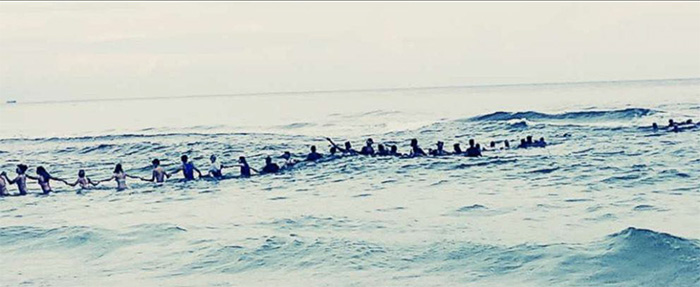
Off the Florida coast, two boys, 8 year old Stephen and 11 year old Noah Ursrey were riding the waves on their boogie boards when a rip tide began pulling them out to sea. When their family members noticed, they jumped in to save them, but they weren’t such strong swimmers and before they knew it an entire family of six were being swept out to sea.
Bystanders phoned for help but professionals were 20 minutes away. Rather than wait for help, a few brave individuals jumped into action. Some of them could not swim but they refused to watch others drown; they, too got caught in the rip tide. The Washington Post describes one person named Jessica Simmons declaring:
“‘These people are not drowning today! It’s not happening…. We’re going to get them out.’” She was a strong swimmer and fearless in the face of adversity.
Despite the fact that, “people on the beach had no rescue equipment, only boogie boards, surf boards and their arms and legs. They began to form a human chain leading to those who were drowning.”
It started with a few, but eventually 80 people formed this long chain about 100 yards long. Together, they plucked all 10 victims from the water, saving their lives.
Later, Simmons posted on Facebook:
“To see people from different races and genders come into action to help TOTAL strangers is absolutely amazing to see!! People who didn’t even know each other went HAND IN HAND IN A LINE, into the water to try and reach them. Pause and just IMAGINE that.” 6[Emphasis hers]
So, the question becomes, how do we tip the scales to the side of justice, love, compassion, respect, and human connection? How do we snap society out of its neglect of others or even fierce hatred of others?
Judaism shares some great wisdom on this matter. The famous Rabbi Moshe ben Maimon, also known as the Rambam, also known as Maimonides, says that we must begin with ourselves.
In the Mishnah Torah, Hilchot Teshuvah, compiled in the 12th century, Maimonides says that we must see the whole world as being equally just and unjust.
And, we must treat every action that we take as the deciding factor of which way the scales of the entire world will fall— will we tip the scales towards human dignity, or human degradation? Will we tip the scales toward love or towards hate?
At this Jewish season of reflection, we ask ourselves: Are we the type of people who will work to prevent avoidable tragedies? Are we the kind of community that can bring that kind of goodness into the world? What kind of world did we create this past year? Did we fulfill our potential? Or did we miss the mark? How can we improve?
As a congregational community, we consider our actions from this past year and ask, did we create communities of care right here at home? Or did we inflict pain on another within our walls? Did we refuse to honor someone’s gender pronouns? Did we balk at a crying baby during a service? Did we make a disparaging comment to another in our congregational family? Did we study Torah and apply it’s ethics to our lives? Did we take every opportunity to stand with one another and stand in solidarity with other communities under attack? Did we engage in communal leadership?
There is actually a great story about that last one:
Rabbi Assi, the great and learned sage, was on his deathbed. And a handful of his top disciples stood around him. They asked: “Rabbi Assi! What could possibly be the matter? You spent your whole life pouring over our sacred texts, expounding upon their meaning!” Rabbi Assi just shook his head.
One of his disciples finally exclaimed, “Rabbi Assi, you were singularly focused on the sacred texts, you didn’t even bother yourself with becoming involved in communal affairs.” “Oy,” said Rabbi Assi, “that’s what I’m worried about! Perhaps I should have rolled up my sleeves and helped others!”
Tonight, and over the next 10 days, we have the opportunity to look in that sacred mirror behind the doors of the ark and consider: if we were to engage in the affairs of the community around, what kind of communities would we want to build? Communities that stand by and watch people drown in a pond, or communities that link up with others in a human chain to save people from the fiercest of rip tides?
Yes, becoming involved in BCC involves some complex conversations, and it takes a lot of dedication which means it takes sacrifice— no, not animal sacrifice— but sacrifice of time and mental capacity and emotional investment— but engaging in these questions means that at least we won’t lie on our deathbed like Rabbi Assi and always wonder, what if I had gotten involved in matters of the community?
And, engaging in the values of Judaism and practicing the deep reflecting that BCC inspires, not only during the High Holy Days but also each Shabbat, inoculates us against our human tendencies to not care about others.
In other words, BCC’s activities and practices are intended to help individuals become more self-reflective, more aware, more accountable and more empathetic.
And participating as your fully integrated and whole self can be incredibly meaningful precisely because BCC is where we strive to see really see each other in our full humanity. And honor that.
This is a place that strives to affirm human dignity. Well, not here literally, since we are currently sitting here at Temple Isaiah and I am talking about what happens at BCC down the street— but really, what happens at BCC has the potential to cure that feeling of deep isolation and impotence amidst truly ghastly indecency that has colored so many of our experiences of the world this year. But, I emphasize its power sits there dormant as potential until you and I and every one of us brings care and empathy and good intentions to life through action. At BCC we can come alive to realize new possibilities and build a community of goodness and hopefully positively influence others. And we are well on our way already.
One need only to flash back to a Shabbat a few weeks ago, where our own Jimmy Falk-Garcia celebrated becoming bar mitzvah with family and friends.
Such a great portion of our BCC family attended the festivities supporting him and celebrating with him and his dads, Jonathan and George, on that day. Many of you came— those of you who remembered when they became a family, or when Jimmy first came to the religious school.
Each person who assembled in our community foyer had a hand in Jimmy’s formation and we assembled to affirm that we were and are communally invested in his success and well-being.
And each of us were equally inspired by the young man he is becoming. These kinds of encounters take us away from the black and white insensitivity of the world and bring us back into the technicolor spectrum of people caring for and about one another, and love filling rooms. This is the beauty of BCC.
Similarly, I felt this feeling of overwhelming human connection and love winning at the PRIDE March through Hollywood and West Hollywood this year. The sheer volume of people who marched in our neighborhood was powerful. Chanting all kinds of affirmations, in unison, I was inspired.
I was most grateful to be able to do this alongside so many of you in this room who showed up to show love— for the LGBT community, for people of all races, and genders and expressions of self. We did so as a community who shows up in all the ways we create sacred space- as affirming of the LGBT community which some people are now calling the MOGI community (that means Marginalized Orientations and Gender Identities). We did this as proud Jews and those who love us.
We did this as a multiethnic and intergenerational group bound together through our values of inclusion, social justice, and care for the well-being of the world and all of its inhabitants. And, we did this alongside our friends from the LA Queer Interfaith Alliance and the World Congress of GLBT Jews.
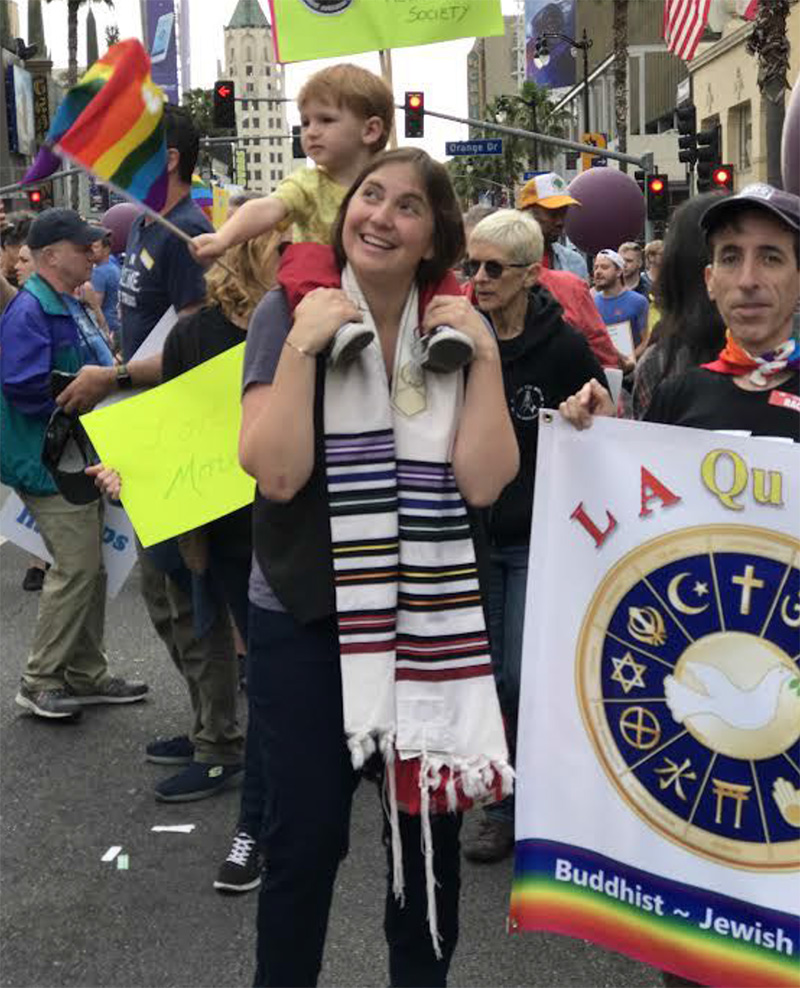
We covered ourselves in these incredible stickers affirming so many expressions of identity.
My two year old stood there among the crowd huddling between me, and our members Elissa Barrett and Josh Gershick, waving the rainbow flag. No wonder he loves to belt out “Somewhere over the Rainbow” — that place where “skies are blue and the dreams that you dare to dream really do come true.” Because that’s what that day was about— making real the dream of a truly inclusive world. Making sure that the rainbow isn’t an unattainable date far into the future, but step by step as a community, we are bringing it to fruition.
Once again, our community brought my heart back to life and I was again inoculated against truly frightening news headlines again for awhile. This is the beauty of BCC.
Third, I felt the power of love and human connection during a session of our BCC Baby Kibbutz this summer. First I should explain that ever since the Gay-by boom— that is the great explosion of babies in the LGBT community in the past 5-10 years—Rabbi Lisa has been dreaming of starting a “Baby Conclave.” She points out that a conclave is gathering of very important people- and babies are those honored individuals. This past year, she asked me to give this community a go— and thus the Tot Shabbat program was born.
But even from our first gathering, the participants including myself, Melissa and our children, discovered that we weren’t an isolated program of babies parallel playing, or each singing songs side by side but not really interacting.
Parents and babies were interacting WITH one another, Babies were taking turns on the slide, and setting the shabbat table together, parents were swapping baby clothes, books, and best practices. One of the members said that we were more than just a program— we were more like a kibbutz— a community of people truly invested in one another’s success and well-being. So we took the name— we are now known as the BCC Baby Kibbutz.
This point was made when, out of the blue, one of our babies, Baby Jack, sat up for the first time at the Baby Kibbutz!
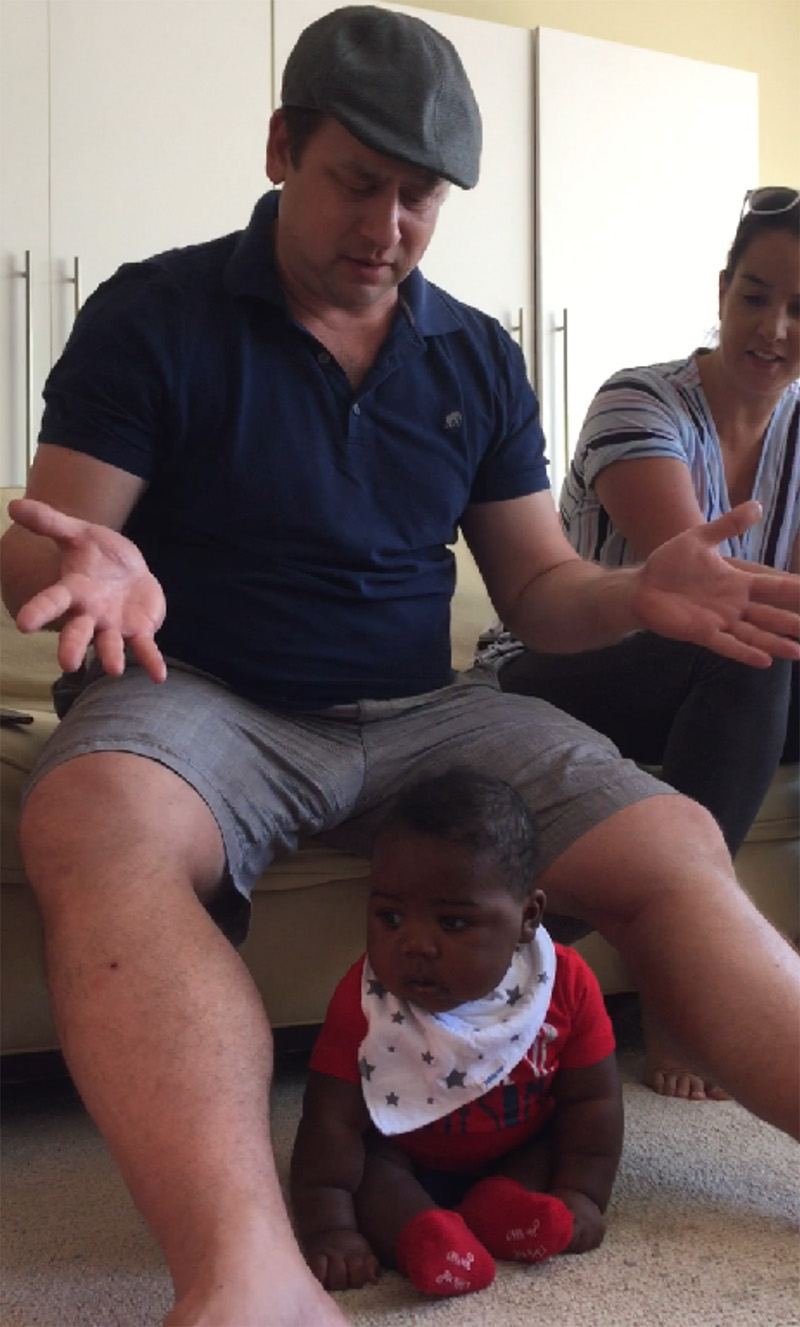
Right in the middle of the song session, we stopped and said a communal Shehecheyanu— thanking God for bringing us to witness this moment in our lives. He also had his first challah at the baby kibbutz, and yes we said a Shehecheyanu for that as well! Here he is with that first fist full of challah with his buddy, Leo. It was this sense of goodness and investment in one another that made BCC so special that day. It is uplifting. It is heartening. It warms the soul. This is the beauty of BCC.
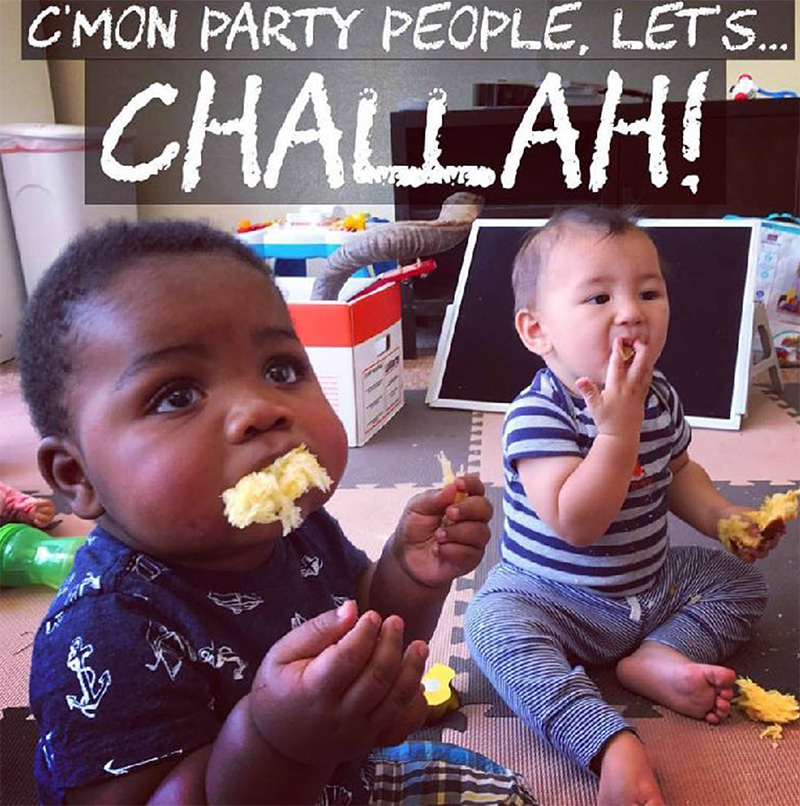
At BCC, we strive to create a community of comfort and celebration for one another. We look to acknowledge the important moments in one another’s lives, whether a retirement, or a bar mitzvah, a wedding, or even an illness, we look to form the bonds of mutual investment in one another.
BCC is where I go to feel better about the world, about humanity. To connect with some of the great angels in this city who are magnifying love in the world.
In the Jewish new year, we contemplate creation. In the first Torah portion, Bereishit, we learn that “It is not good for human(s) to be alone.” And we know that community can empower us and uplift. With your help this coming year, BCC will continue to be that place where we go to infuse our souls with hope for the world.
As we turn to the new year, we may consider what offerings we can make to the activity of transforming the world. And our tradition teaches that building up sacred spaces transforms the offerer.
Commenting on the Torah portion called Terumah which means “offering,” Rabbi Shai Held, a friend of mine from my days in Boston, notes the play on words that comes from the similarity between the words misken and mishkan. Misken means a poor person in the throws of self-pity and despair, and the mishkan is the dwelling place of God.
Right in our own text, we see that the Israelites, in their misken/ their heartfelt despair wandering in the desert for so long, undertook plans to join together to build a mishkan/ a tabernacle, and in the process, they were lifted out of their sadness to a place of hope and purpose.
Since ancient times, it seems that building sacred community is the antidote to the kind of deep sadness that has the power to overtake human experience. I believe this is so because engaging in positive community affirms our selves as whole people, it reminds us of our collective power to effect transformative change, it positively impacts systems and society which ultimately alleviates the source of pain. BCC is a beautiful place that invites us to do just that— that’s the beauty of BCC.
Looking in the mirror behind the doors of the ark, we might see that we are all guardians of that activity at BCC and in the world around us. We each have a role to play literally or metaphorically pulling up a chair for a newcomer and saying that there is a place for you, too, at the table. Your existence is precious in this community. Help us to continually become the community we are meant to be. The community that strives to hold itself beyond the simple standard of secular law, but rather to the standard of dinei shamayim, the heavenly courts.
The more we do this as individuals and as a community, the more we inspire those around us. And, we can be proud to think of Maimonides smiling down on us, appreciating our attempt at tipping the scales of the world to the side of goodness. This is the beauty of free will in the universe. This is the beauty of community in the universe. This is the beauty of BCC!
May we be ever inspired by the community we create at BCC, and may it embolden all of our endeavors out in the world in this coming year, in the next, and beyond! AMEN!
——-
1. Adapted from a text found in Rabbi Don Goor’s High Holy Day files archived at the Hebrew Union College-Jewish Institute of Religion Los Angeles Tartak Center.
2. http://www.cnn.com/2017/07/20/us/florida-teens-drowning-man/index.html
3. Ibid.
4. http://www.cnn.com/2017/07/20/us/florida-teens-drowning-man/index.html
5. Babylonian Talmud, 56a.
6. www.washingtonpost.com/amphtml/news/morning-miz/wp/2017/07/11/a-riptide-swept-away-a-florida-family-then-beachgoers-formed-a-human-chain/
One Comment on “Building Sacred Community: Erev Rosh Hashanah 5778”
-
Charna Posin September 25, 2017 pm30 9:03 pm .
Stunningly inspiring the night you delivered it and even more profound reading it a second time. Thank you for posting it.




